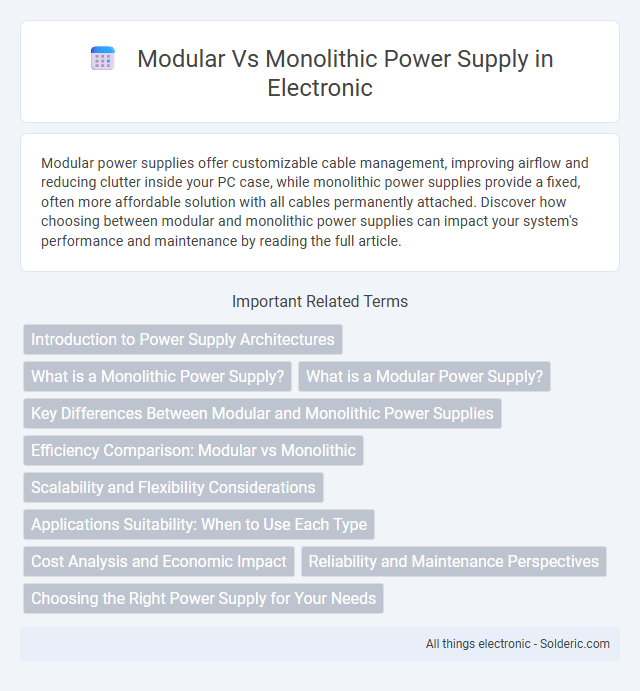Modular power supplies offer customizable cable management, improving airflow and reducing clutter inside your PC case, while monolithic power supplies provide a fixed, often more affordable solution with all cables permanently attached. Discover how choosing between modular and monolithic power supplies can impact your system's performance and maintenance by reading the full article.
Comparison Table
| Feature | Modular Power Supply | Monolithic Power Supply |
|---|---|---|
| Cable Management | Detachable cables for neat, customizable setup | Fixed cables, less flexible and harder to manage |
| Installation | Easy and clean installation with removable cables | More cluttered setup due to permanent cables |
| Cost | Higher price due to additional connectors | More affordable, fewer manufacturing costs |
| Upgrade & Maintenance | Simple to upgrade, replace, or repair cables | Challenging to replace cables, full unit often needed |
| Airflow & Cooling | Better airflow, less cable clutter inside PC | Restricted airflow from tangled cables |
| Reliability | Potential connection issues with modular ports | Generally stable, fewer connection points |
| Target User | PC enthusiasts, custom builders, neatness-focused users | Budget-conscious users, basic builds |
Introduction to Power Supply Architectures
Power supply architectures in computers typically fall into two categories: modular and monolithic designs. Modular power supplies feature detachable cables, allowing users to connect only the cables they need, enhancing airflow and reducing cable clutter inside your PC. Monolithic power supplies have fixed cables permanently attached, which can simplify installation but may limit flexibility and cable management options.
What is a Monolithic Power Supply?
A Monolithic Power Supply integrates all components into a single, solid unit, providing a fixed, non-adjustable power output. Its compact design reduces complexity and cost but limits customization and scalability compared to modular units. Understanding your power needs is crucial since your choice affects system flexibility and upgrade potential.
What is a Modular Power Supply?
A modular power supply allows you to connect only the cables you need, reducing clutter and improving airflow inside your computer case. This design enhances customization and eases cable management compared to monolithic power supplies, which come with all cables permanently attached. Your system benefits from a cleaner setup, better cooling, and easier upgrades with a modular power supply.
Key Differences Between Modular and Monolithic Power Supplies
Modular power supplies feature detachable cables that enhance airflow and simplify upgrades, while monolithic power supplies have fixed cables integrated into a single unit, reducing initial cost and complexity. Modular units offer superior customization and cleaner cable management, beneficial for high-performance PC builds, whereas monolithic designs provide reliability through fewer connection points and a compact structure. Efficiency ratings and power output ranges can vary, but modular supplies generally prioritize flexibility and scalability in diverse system configurations.
Efficiency Comparison: Modular vs Monolithic
Modular power supplies offer improved efficiency by allowing users to connect only the necessary cables, reducing clutter and enhancing airflow, which leads to better cooling and less energy waste. Monolithic power supplies typically have fixed wiring, causing unnecessary cables to consume space and potentially obstruct airflow, resulting in slightly lower overall efficiency. Studies show modular designs can improve power delivery efficiency by up to 5% compared to monolithic models due to optimized cable management and reduced resistance.
Scalability and Flexibility Considerations
Modular power supplies offer superior scalability and flexibility by allowing users to connect only the necessary cables, facilitating easy upgrades and customization to match varying system requirements. Monolithic power supplies, with fixed cable configurations, limit expansion options and often result in excess unused cables, reducing airflow and increasing clutter. Scalability concerns favor modular designs in dynamic environments where power demands frequently change or expand.
Applications Suitability: When to Use Each Type
Modular power supplies are ideal for custom PC builds and high-performance gaming rigs where cable management and airflow optimization are crucial, as they allow users to connect only the necessary cables. Monolithic power supplies suit budget builds or simple office computers where ease of installation and lower costs are prioritized over customization. In professional environments requiring reliable and scalable power delivery, modular units often provide greater flexibility to accommodate future upgrades.
Cost Analysis and Economic Impact
Modular power supplies typically have a higher upfront cost due to their customizable cables and advanced design, but they reduce long-term expenses by improving airflow and reducing energy waste in your system. Monolithic power supplies are more cost-effective initially, making them suitable for budget-conscious builds, but they may lead to increased cooling costs and potential upgrades over time. Evaluating the total economic impact, modular units often offer better value for users prioritizing efficiency and future-proofing in gaming or professional setups.
Reliability and Maintenance Perspectives
Modular power supplies offer enhanced reliability by allowing you to replace or upgrade individual cables without disrupting the entire system, reducing downtime and simplifying maintenance. Monolithic power supplies, while generally robust, require more extensive disassembly for repairs or cable replacements, increasing the risk of damage and prolonged system outages. From a maintenance perspective, modular designs streamline troubleshooting and customization, improving overall system uptime and serviceability.
Choosing the Right Power Supply for Your Needs
Selecting between a modular and monolithic power supply depends on factors like system customization, cable management, and budget. Modular power supplies offer flexibility by allowing users to attach only the necessary cables, improving airflow and minimizing clutter, ideal for custom PC builds and upgrades. Monolithic power supplies provide a fixed set of integrated cables, often at a lower cost, making them suitable for straightforward, budget-conscious systems without frequent hardware changes.
Modular vs Monolithic Power Supply Infographic

 solderic.com
solderic.com